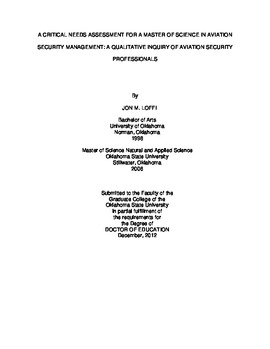| dc.contributor.advisor | Bliss, Timm | |
| dc.contributor.author | Loffi, Jon M. | |
| dc.date.accessioned | 2013-11-26T08:34:41Z | |
| dc.date.available | 2013-11-26T08:34:41Z | |
| dc.date.issued | 2012-12 | |
| dc.identifier.uri | https://hdl.handle.net/11244/7488 | |
| dc.description.abstract | The world was changed by a significant event in aviation on a beach at Kitty Hawk, North Carolina on December 17, 1903. The first sustained flight of an aircraft under power was realized. The world looked on as another aviation event changed the world on the morning of September 11, 2001. The world witnessed asymmetrical warfare, as a relatively small number of committed individuals transformed four U.S. commercial airplanes into missiles and committed mass murder of innocent people in America's homeland. The purpose of this qualitative study was to conduct detailed personal interviews with aviation security professionals in the private and governmental sectors to determine knowledge demands and essential professional skill sets needed for employment in the aviation security environment. A purposeful sample of 10 aviation security management professionals was selected for interview guided by three research questions that were related to the following areas; knowledge demands and skill sets needed for employment in the aviation security environment, best teaching practices that need to be implemented by higher education faculty, and exploring a pragmatic approach to a Master of Science degree in Aviation Security. The data from the interviews was analyzed using Nvivo 10 software. Three major themes of data produced 14 subthemes which emerged from the interviews. The analysis of the data disclosed common themes associated with knowledge demands and skill sets, teaching methods, and pedagogy. This study discovered the critical components needed for a Master of Science degree in Aviation Security Management. America�s institutions of higher learning can significantly transform tomorrow�s aviation security managers and enable the professional work force to make air travel safer. However, educational course work, especially at the graduate level, in the field of aviation security is woefully inadequate across the United States. The results of this study increases the body of knowledge in academia and provides recommended course work and teaching methods needed to educate and prepare students for employment in the field of aviation security management. | |
| dc.format | application/pdf | |
| dc.language | en_US | |
| dc.rights | Copyright is held by the author who has granted the Oklahoma State University Library the non-exclusive right to share this material in its institutional repository. Contact Digital Library Services at lib-dls@okstate.edu or 405-744-9161 for the permission policy on the use, reproduction or distribution of this material. | |
| dc.title | Critical needs assessment for a Master of Science in Aviation Security: A qualitative inquiry of aviation security professionals | |
| dc.contributor.committeeMember | Depperschmidt, Chad | |
| dc.contributor.committeeMember | Marks, Steve | |
| dc.contributor.committeeMember | Miller, Bridget | |
| osu.filename | Loffi_okstate_0664D_12412.pdf | |
| osu.accesstype | Open Access | |
| dc.type.genre | Dissertation | |
| dc.type.material | Text | |
| dc.subject.keywords | aviation | |
| dc.subject.keywords | master of science | |
| dc.subject.keywords | security | |
| thesis.degree.discipline | Applied Educational Studies | |
| thesis.degree.grantor | Oklahoma State University | |
